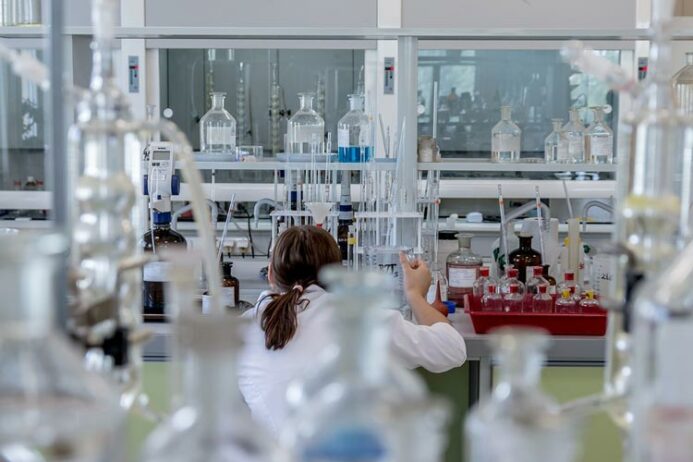Laboratory glassware requires mindful care. Once it’s been cleaned and inspected, it should be stored to prevent it from becoming dirty, getting in the way, getting broken, or getting lost. Your lab tables should always come equipped with storage solutions that allow you to easily store glassware so that it can be found when needed.
In this article, we’ll discuss the proper ways to store laboratory glassware.
Store in an Enclosure
Lab cabinets are ideal storage solutions for glassware because they keep the glassware out of the way of regular daily activities while still being close enough to workstations. Glass items are consistently in use in laboratories; when you need them, it’s important to be able to grab them without wasting time walking and searching.
Opt for closed shelving to keep dust away from the glassware so that it’s clean for every use.
Label Cupboards
There should be a sign stating the type and size of the glassware stored inside the cupboard. This will save time when searching for items that you need. It’s crucial that this guideline is followed because without it, you’ll wind up throwing cupboard door after cupboard door open looking for your equipment. This wastes valuable time.
Note down warnings for use and storage along with names. Some glassware may not be able to be stored with others because of what chemicals you use them for. While you’ll ideally have cleaned off any remnants of your work before storing, residue may still linger. Using contaminated glassware may cause disastrous results for your work down the line.
Logical Storing
All glassware should be stored in a way that makes sense. Glassware can be grouped with others of its type, size, or according to the purpose. For example, if you have certain types of glassware that deals primarily with one type of chemical, it’s best to keep them together. This will ensure that they are easily found when needed by workers.
Also, when it comes to a decision about where to store glassware, it’s important to make good choices. For instance, if your glassware keeps breaking because they are stored in high, hard-to-reach cupboards, consider storing them in low cabinets instead.
Further, when it comes to space in your cabinets, make sure there’s enough for a person to grab a single item of glassware without disturbing the other items stored inside. Having a cabinet overfilled will be just as problematic as leaving glassware out.
Arrange by Location
If your workers frequently use the same glassware, it only makes sense that that glassware is accessible from their workstations. Lab benches incorporated with storage solutions are perfect for when glassware needs to be nearby. On the other hand, items that are not used as frequently can be stored further away from workstations, which will help make day-to-day life in the space much easier.
Read More: How To Increase Storage and Efficiency With Your Lab Tables
Maintaining Room Temperature
When you’re storing unused glassware, the temperature may play a critical factor. Maintaining a steady room temperature means that no variance will occur, which could cause the glass to break. For example, when you boil water in a glass and then put it on a cold countertop, it could shatter because of the heat variance. Similarly, glassware stored in a cold room may break when that temperature goes up.
Avoiding Risk
Glassware should never be stored near the edge of benches, other lab furniture, or places where it can be knocked over. It makes no sense to keep unused glassware out in the open where it can be knocked over and broken. Avoid storing them in too-high shelves as well, as they will be difficult to reach, making storage more prone to accidents.
Store According to Type
Specific glassware may require certain guidelines to ensure their safety in storage.
Volumetric Flasks
Volumetric flasks need to be stored with their stoppers to ensure that stoppers are not lost. While you can purchase just the stoppers, it will save your lab money if you would simply be mindful of your glassware from the beginning.
Round-Bottom Flasks
Round-bottom flasks should be stored with cork rings to keep them upright. Avoid storing these in high shelves, as one mistake can cause your flask to roll out of the cabinet and break.
Burettes and Pipettes
Burettes and pipettes should be stored vertically in specially-designed racks, or horizontally in drawers. They should not be stored in cramped spaces as these items are very thin and are susceptible to breaking.
Other
Glassware that you use rarely should be stored separately and labeled so that workers know where everything goes and nothing gets lost.
Before Storing
Another thing to keep in mind when it comes to the storage of glassware is making sure that it’s clean and free of contaminants and dust. Never forget to sanitize all of the equipment properly before storage. This will save time cleaning and drying equipment during your next use.
Read More: Easy Guide to Keep Your Laboratory Clean
More importantly, some chemicals left out can change and react to other substances, so it’s simply not safe to put dirty glassware away. Others may even stain or stick to the inside of your glassware when not cleaned immediately, rendering the items useless.
When it comes to storing your glassware, make sure that you use only the best to avoid breakage and the loss of valuable data.
How do you store your lab glassware? Let us know in the comments!
